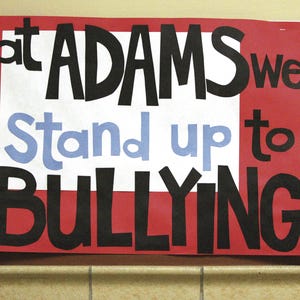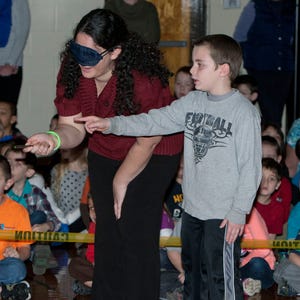Can schools and teachers be held responsible if a bullied student commits suicide?The Kentucky Supreme Court took up the question on Wednesday after the family of 13-year-old Stephen Patton sued teachers and school administrators. Defense attorneys disputed whether Stephen was even bullied and said they hadn't seen any other lawsuits where a family was able to hold school officials negligent.
Stephen Patton Stephen, a 6-foot-3, 196-pound boy, towered over classmates, but his imposing presence didn't protect the shy kid with a stutter from bullies — and ultimately his suicide, his lawyer told the justices. The eighth-grader at Allen Central Middle School in Floyd County shot himself to death in November 2007 after he was constantly bullied in the school's halls and cafeteria, said his family's attorney, Vanessa Cantley."The teachers knew about it and they did nothing. They violated clear directives from school procedure," Cantley said.Attorneys for seven school officials named in the suit countered that Stephen never complained to anyone. Stephen didn't leave a note, and they said his suicide was a mystery."There is absolutely no proof ... to demonstrate that he committed suicide because of anything that had to do with the school or the school district," said attorney Jonathan Shaw.Neal Smith, an attorney for four teachers, said Stephen had suffered from migraines since age 5 and told another student he would rather die than have another severe headache.Cantley said children are unlikely to admit being bullied out of embarrassment and fear of retaliation.
The lawsuit was dismissed by a Floyd County judge, a ruling upheld by the Kentucky Court of Appeals. The Patton family is asking the Supreme Court to send the case back to Floyd County for trial.Cantley said a jury should decide if the alleged bullying was a "substantial factor" behind the suicide.
The justices grilled attorneys from both sides."Bullying is a matter of judgment with the teacher, is it not?" Justice Bill Cunningham asked.
Cantley said the district's anti-bullying policy specifically delves into what constitutes bullying and what teachers should do.Smith said it's difficult for teachers to determine the difference between bullying and horseplay.
Here's the backstory from USA Today:"If every incident of horseplay must be considered bullying, then the teachers won't be teaching," he said. "They'll be filling out bullying forms all day, every day."Justice Lisabeth Hughes Abramson noted "there's probably no more difficult time than middle school.""I doubt anybody went through middle school without either observing or participating in or being bullied," she said.The attempt to pin negligence on school officials for a bullied student's suicide could have broader ramifications, Abramson said. The family of a domestic violence victim who commits suicide, for example, could try to hold the perpetrator responsible for the death, Abramson said."It seems to me that suicide is one of those complex, human events that has so many factors," Abramson said.Cantley said Stephen was mocked for his stutter, and had his lunch box seized by bullies who took whatever they wanted and threw the rest on the floor."He never fought back," she said. "He was a gentle giant."The Patton family is seeking unspecified monetary damages in the suit. The family wants to use that money to set up a memorial foundation in Stephen's name to provide anti-bullying education and training, she said.
By all accounts, most of Stephen Patton's classmates liked the cheerful eighth-grader.
But a few of them at Allen Central Middle School in Eastern, Ky., repeatedly abused, taunted and bullied the 13-year-old gentle giant, who stood 6 foot 3, weighed 196 pounds and had a stutter, his family said they discovered.
On Nov. 27, 2007, Stephen placed a gun to his head and took his own life.
Now on Wednesday, eight years later, the Kentucky Supreme Court here will hear arguments on whether schools can be held liable for failing to stem bullying that causes a student's suicide.
Stephen's mother, Sheila Patton, sued on his behalf, saying that four teachers, two school superintendents and Principal Davida Bickford knew he had been bullied daily but did nothing to stop it.
"Stephen would not want another student to go through what he suffered," Patton said, explaining why she brought the lawsuit.
Green Bay schools ban LGBT bullying
"We cannot let our son die in vain."
The defendants in the school of more than 300 students in Eastern Kentucky about 125 miles from the state capital say Stephen's death was heart wrenching but deny they knew about the hazing. Even if they had, they say it would have been impossible for them to foresee that Stephen would kill himself when his death took his own mother and friends by surprise.
The teachers and administrators have prevailed in two lower courts, but the Supreme Court will decide whether to reinstate the lawsuit in a case that could have major consequences, given the prevalence of bullying and how often young people consider suicide.
About 16% of students in grades 9 to 12 say they thought about taking their own lives in the prior 12 months, according to the federal Centers for Disease Control and Prevention while other studies have found that victims of bullying at school are two to nine times more likely to consider suicide than nonvictims.
Executive Director Wayne Young of the Kentucky Association of School Administrators, which represents 3,000 educators, said it would be frighteningly unfair to hold them accountable for something so unpredictable.
"How in the world will we be able to talk young people into becoming teachers or principals if they are held responsible for a student's suicide?" he asked.
Brad Hughes, spokesman for the Kentucky School Boards Association, said schools try to prevent bullying because it makes it harder for students to learn, but he said it would be unfair to hold them accountable for something they didn't know about or that happens away from school.
Stephen killed himself at home, in his own bedroom.
Patton's suit is thought to be the first of its kind in Kentucky, but across the USA a flood of grieving parents have filed a flood of similar complaints. In the past year alone, suits have been filed in Chicago; East St. Louis, Ill.; Las Vegas; and Snohomish, Wash., according to press accounts.
But while such litigation continues unabated, teachers and school districts have won most of the cases, said Perry Zirkel, a professor of law and education at Lehigh University in Bethlehem, Pa. He puts the odds of parents winning at 1 in 10.
Parents who lose a child to suicide are empathetic plaintiffs but he sees competing interests, including the burdens to teachers and taxpayers who ultimately pay the tab.
Although every state except Montana has laws against bullying, Kentucky has not spelled out legal remedies for bullying in its statute, according to StopBullying.gov. And courts have been reluctant to hold teachers or schools liable for a suicide — what is seen as an unpredictable tragedy — absent proof that school employees had direct knowledge a student was suicidal and did nothing, or as one scholar put it, took a "cruel stance toward the plight of a severely bullied student."
Patton and her lawyer, Vanessa Cantley, say that is what happened to Stephen.
In her brief to the Supreme Court, Cantley cites an affidavit from former student Phyllis Smith, who said she watched in the hall as students made fun of Stephen's stutter in front of teachers, who did nothing.
Another student, Zack Shepherd, told how students bullied Stephen at lunch, taking items out of his lunch box and scattering the rest. On two occasions, Zack, Stephen and a third boy reported Stephen's bullying to Bickford, the principal, but Zack said she "blew us off," according to the brief.
Teachers allowed other students to be bullied with no consequences for the bullies. Students put gum and barbecue sauce in Phyllis' hair. While teacher Patricia Handshoe, one of the defendants, picked it out, Handshoe did nothing to punish the girls who put it there, according to the brief.
The school's hallway cameras might have documented incidents of bullying, but Bickford testified that the secretaries in charge of monitoring the cameras were never trained in how to recognize it, Cantley said.
If the case goes to trial, students will testify that Stephen made statements regarding his impending suicide that a reasonable juror could attribute to bullying, according to the court brief.
Harm can continue even after bullying stops
But lawyers for the teachers and administrators say they saw no signs Stephen was suicidal.
They contend he suffered from a variety of other maladies, including migraine headaches since age 6, that could have prompted him to end his life.
In fact, he once said to another student that he would rather die than have another migraine, the teachers' lawyers, Neal Smith and Todd Kennedy, say in their brief.
They note that the only teacher who even suspected Stephen might have been bullied one day asked him about it and he assured the teacher that he and the other students were "having fun."
Bickford testified in a deposition that she never saw Stephen being bullied and nobody ever told her that he was.
The defendants also note that Jon Akers, director of the Kentucky Center for School Safety, testified the school had an effective anti-bullying policy in place and followed it.
Researchers unsure of success of anti-bullying programs
That program included educating teachers and students about bullying and offering a "bullying box" that allowed students to make anonymous reports.
Judge John David Caudill of Floyd County Circuit Court threw out Patton's suit, in part because he found the defendants enjoyed what is known as qualified immunity. The courts generally don't allow defendants to be held liable for a person's suicide because it is an intervening act that they couldn't reasonably be expected to foresee.
Exceptions include a jailer knowing that an inmate is suicidal and not taking reasonable steps to prevent him from killing himself. However, Caudill said, "The record is clear that Stephen was not known to be suicidal."
The Kentucky Court of Appeals held that the defendants were not immune from a suit but found they couldn't be liable for a suicide, especially one that didn't occur at school.
Two girls arrested on bullying charges after suicide
Cantley concedes that not every case in which a student is bullied and ultimately commits suicide should result in a viable lawsuit. But she asks the Supreme Court to find that suicide is not a total bar against recovery of damages.
In e-mail she said if the court sends that case back for a jury trial and the estate prevails, his parents will use any proceeds to start a foundation in Stephen's memory to finance anti-bullying education and training.
"Every day, teachers and school administrators throughout this state teach students that if rules are broken, consequences follow," Cantley said. Here "rules were broken. Stephen Patton died. But there have been no consequences for those who broke the rules."
The first suit in which a school district was found liable for a student's suicide also involved a 13-year-old.First case in the country
After Shawn Wyke tried to hang himself in October 1989 in a restroom of his junior high school in Polk County, Fla., the dean of students called him into his office, read Scripture to him and took no further action. He didn't tell Shawn's parents or inform other school officials.
Shawn tried to kill himself again on school grounds later the same day then hanged himself in his back yard a couple of days later.
A court found the school district could be found liable for failing to notify Shawn's parents, saying "a prudent person would not have needed a crystal ball to see that Shawn needed help and that if he didn't get it soon, he might attempt suicide again." The court also said "the risk of a child's death substantially outweighs the burden of making a phone call."
A jury returned a $500,000 verdict although the school district was found responsible for only a third of it.












